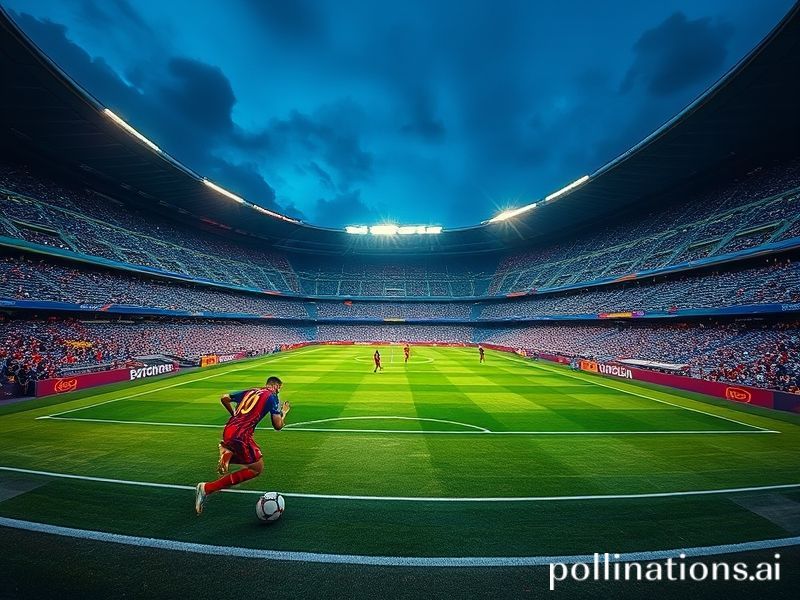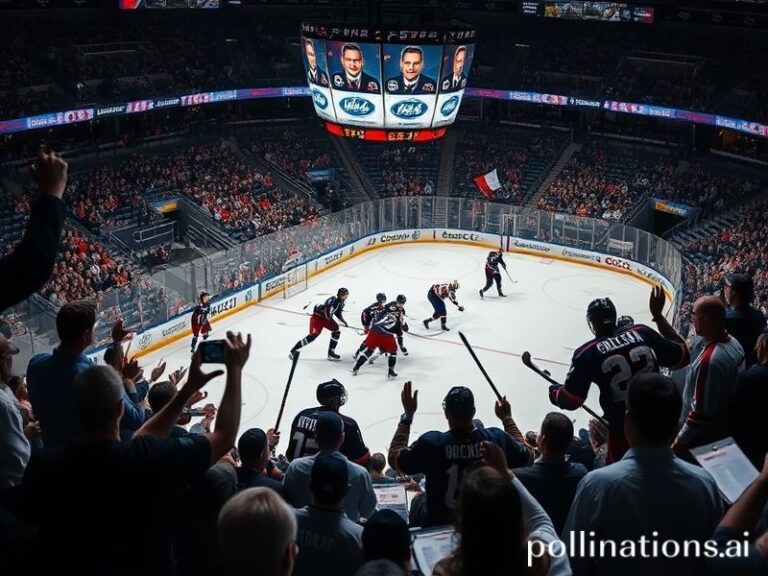La Liga: Spain’s Weekly Therapy Session, Now Streaming to a Planet in Crisis
Madrid, 03:42 a.m. local—While half the planet doom-scrolls through another slow-motion geopolitical car crash, a different kind of catastrophe plays out in 4K slow-motion on beIN Sports: Real Madrid conceding a 93rd-minute equalizer to a team whose annual budget wouldn’t cover their left-back’s hair gel. Welcome to La Liga, Spain’s weekly referendum on national neuroses, now beamed to 650 million homes that can’t vote but still scream at the screen.
In theory, La Liga is just twenty teams kicking a ball shaped like the Earth after we’ve extracted everything useful from it. In practice, it is the last surviving Habsburg marriage of sport and soft power—an arranged union nobody believes in but everyone shows up to. Barcelona still prints “Més que un club” on seats warmed by tourists who discovered the city via a Ryanair glitch fare. Atlético Madrid, the league’s designated gothic dungeon, now sells NFTs of Diego Simeone’s scowl. And somewhere in Riyadh, a minister wonders whether buying the entire bottom half outright might be cheaper than buying nuclear parts from North Korea.
Globally, the league has become a kind of Iberian Netflix: addictive, multilingual, and increasingly financed by Gulf viewers who binge the product at ungodly hours. Last season, Saudi Arabia accounted for 11 % of La Liga’s international streaming revenue—coincidentally the same percentage by which they reduced domestic beheadings during the World Cup bid. The numbers are flattered further by China, where millions wake at dawn to watch Athletic Bilbao set pieces as if they were ritual tea ceremonies. In return, Chinese manufacturers stamp “Official La Liga Partner” on soccer balls assembled by people who have never been allowed to kick one.
Yet the league’s greatest export isn’t goals; it’s nostalgia for a time when small clubs could dream. In 2023, Girona—a city best known for its medieval Jewish quarter and Ryan Gosling look-alike contests—qualified for the Champions League. Their wage bill was roughly what Manchester United spends annually on severance packages. Naturally, the City Football Group noticed, bought a 47 % stake, and turned the miracle into a subsidiary. Somewhere in a Delaware filing cabinet, Girona’s future is already collateralized into a synthetic bond called GIR-23, rated BBB+ by Moody’s and trending on TikTok.
Economists love to point out that La Liga’s revenue (€5.1 billion last year) could fund Spain’s entire primary-school system for nine months. Economists also love to ignore that the league’s tax optimization schemes could fund an asteroid-deflection program, if anyone still believed in long-term thinking. Meanwhile, the Spanish Treasury keeps a special desk labeled “Football IOUs,” manned by a civil servant whose only job is to convert unpaid image-rights invoices into sovereign debt. He looks disturbingly happy.
The true international significance reveals itself on derby day, when the Madrid metro becomes a rolling United Nations of schadenfreude. Korean teenagers in Vinícius jerseys film themselves arguing with Frankfurt bond traders wearing retro Raúl shirts. Everyone speaks English badly and profanity fluently. Somewhere behind them, a Senegalese street vendor sells knock-off scarves stitched in Bangladesh, priced in dollars because euros are now a nostalgia product. The entire spectacle is livestreamed to Lagos Uber drivers on their lunch break, who place micro-bets using airtime credits. Capitalism has finally achieved what Esperanto never could: a common language based entirely on offside decisions.
And so, as another season limps toward its predetermined climax—Real or Barça, rinse, repeat, check VAR for existential dread—La Liga remains what it has always been: a brightly lit distraction from the slow implosion of everything else. It won’t solve climate change, inequality, or the fact that your phone now listens to your dreams. But for ninety minutes, plus stoppage time for geopolitical anxiety, it offers a tolerable illusion that someone, somewhere, is still keeping score.







